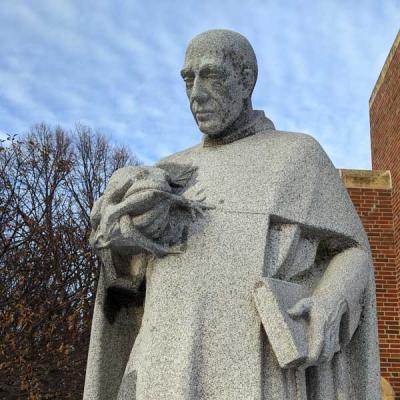St. Albert the Great
Albert of Lauingen (1200-1280), Patron of the Province, was already given the title "the Great" in his lifetime. Born in Southwestern Germany where the Danube river begins, he studied at the University of Padua; there he entered the Order of Preachers, a unique form of religious life occupied with ministry in the new areas of the city and the university. Completing his studies in Paris, he became the first Master, the first full professor of German origin at one of the new European universities. At the end of 1245 Thomas Aquinas arrived in Paris as a Dominican novice and became Albert’s student. Three years later Albert was sent to Cologne to found the first university in Germanic and Slavic lands, and Aquinas accompanied him.
In the following decades Albert worked to draw new ideas and sources through the perspective of Aristotle into a unified theory for that age. He published books not only in theology but in psychology and other fields of natural science. He wrote on topics such as how the senses work, memory, sleep and dreams, youth and old age, nourishment. He also addressed the history of religion, holding that all the world’s religions formed a single long salvation history. He was an extraordinary intellectual presence in a society that was changing dramatically.
The past 30 years have brought an unprecedented time of research and publication on Albert:
- The Albertus-Magnus-Institut in Bonn has been editing a critical text of Albert’s writings in 41 volumes. The Institute also hosts visiting scholars, holds symposia, aids in the production of books and dissertations, sponsors two series of short monographs, and offers much online in its websites.
- In the United States, Irven M. Resnick & Kenneth F. Kitchell, Jr., published Albert the Great: A Selectively Annotated Bibliography (1900–2000) (Tempe: Arizona Center for Medieval and Renaissance Studies, 2004). Prof. Resnick has edited an 800-page A Companion to Albert the Great: Theology, Philosophy, and the Sciences (Leiden: Brill, 2013).
- The International Albertus Magnus Society has been established: it sponsors events and gives online information on Albert.
- From the large number of publications in the last 20 years, particularly in Germany, there is the collection of 20 essays, T. F. O’Meara, ed., Albert the Great: Theologian and Scientist (Chicago: New Priory Press, 2013).
Albert is an inspiration for those exploring conversations between the natural sciences and Christian revelation. He remains an example and source for all who seek to express the Gospel in the cultural languages of their time.

